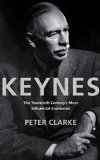
The Rise, Fall, and Return of the 20th Century's Most Influential Economist
by Peter Clarke
The ideas of John Maynard Keynes inspired the New Deal and helped rebuild world economies after World War II —and were later dismissed as 'depression economics.' Then came the great meltdown of 2008. Market forces that the world relied on suddenly failed to self-correct—and Keynes’s doctrine of corrective action in an imperfect world became more relevant than ever.
Keynes was not a traditional economist: He was a polemicist, iconoclastic public intellectual, peer of the realm, and political operative, as well as an openly homosexual Bohemian who befriended Virginia Woolf and E. M. Forster. In Keynes, noted historian Peter Clarke provides a timely and masterful accounting of Keynes’s life and work, bringing his genius and skepticism alive for an era fraught with economic difficulties that he surely would have relished solving.
"There are lessons aplenty to be drawn from Clarke's recitation of the facts of Keynes's life and thought - not least the lunacy of cutting government spending in tough times. A useful, timely primer." - Kirkus Reviews
"Despite their best efforts, neither of Keynes's vicars on earth is quite able to recreate that golden light. We will remain in the economic darkness for a while longer." - The Independent (comparing Peter Clarke's book on Keynes and Robert Skidelsky's book on the same topic)
"Peter Clarke’s biography could not be more timely or stimulating." - Daily Express (UK)
"Skidelsky and Clarke have written books - each barely 200 pages - which ought to be required reading for every prospective minister." - The Guardian (UK)
This information about Keynes was first featured
in "The BookBrowse Review" - BookBrowse's membership magazine, and in our weekly "Publishing This Week" newsletter. Publication information is for the USA, and (unless stated otherwise) represents the first print edition. The reviews are necessarily limited to those that were available to us ahead of publication. If you are the publisher or author and feel that they do not properly reflect the range of media opinion now available, send us a message with the mainstream reviews that you would like to see added.
Any "Author Information" displayed below reflects the author's biography at the time this particular book was published.
Peter Clarke was formerly a professor of modern history and Master of Trinity Hall at Cambridge. His many books include The Last Thousand Days of the British Empire, The Keynesian Revolution in the Making, 1924–1936, and the acclaimed final volume of the Penguin History of Britain, Hope and Glory, Britain 1900–2000. He lives in Suffolk, England, and Pender Island, British Columbia.
Your guide toexceptional books
BookBrowse seeks out and recommends the best in contemporary fiction and nonfiction—books that not only engage and entertain but also deepen our understanding of ourselves and the world around us.